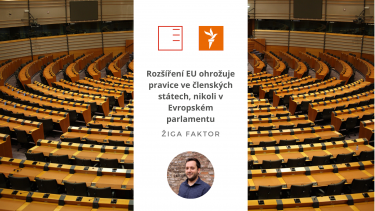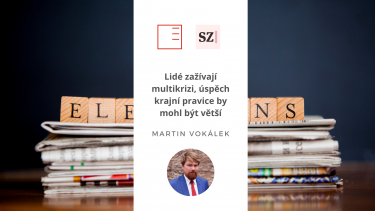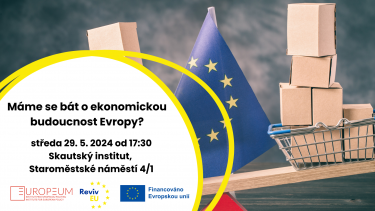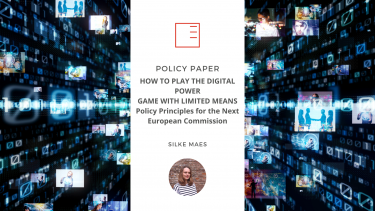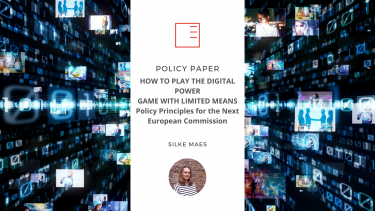Radio Free Europe | EU Enlargement is threated by the far right parties in Member States, not in the European Parliament
Even thought parties belonging to the far right achieved good results in the European elections, their growth was not enough to have a major impact on politics in the future European Parliament. What developments can we anticipate with regard to the policy of enlargement of the EU after the elections? Žiga Faktor, deputy director and head of EUROPEUM Institute's Brussels office, comments on the situation for Serbia's Radio Free Europe.
Show more
Seznam Zprávy | People experience multi-crisis, success of the far right could be greater
Despite the rise in support for the far right in most countries, the direction of the EU will not fundamentally change. The People's Party maintains its position as the strongest faction and gains support from centrist parties. The victory of the extreme right in the elections signals the strengthening of conservative and populist parties. However, it is expected that key issues such as the environment and migration will remain on the agenda. The election result does not signify a radical change but serves as a signal to focus on voters favoring conservative and far-right parties. Martin Vokálek, Executive Director of EUROPEUM Institute, commented on the results for Seznam Zprávy.
Show more
RevivEU | Should we fear for the economic future of Europe?
We invite you to a public podcast recording focusing on the discussion of the impacts of the COVID-19 pandemic on European industrial policy and its potential consequences for the Czech economy and society. We will discuss the new technological dynamics resulting from the pandemic and explore ways in which the European Union can respond to technological competition with the USA and China.
Show morePolicy Paper | HOW TO PLAY THE DIGITAL POWER GAME WITH LIMITED MEANS Policy Principles for the Next European Commission
In the global competition for technological dominance, this policy brief sets out six principles for the next Commission on how to play the digital power game with limited resources. Despite the size of its market, the EU lacks common fiscal capacity, capital markets and labour market dynamics. Writes Silke Maes, Research Fellow at EUROPEUM Institute.
Show morePolicy Paper | HOW TO PLAY THE DIGITAL POWER GAME WITH LIMITED MEANS Policy Principles for the Next European Commission
Svět se nachází v horké fázi globální soutěže o nadvládu v nových technologiích. Pokud chce EU zůstat do budoucna konkurenceschopná, musí být více aktivní. Jak na to rozebírá náš nejnovější policy paper z pera výzkumné pracovnice Silke Maes. Navrhuje v něm šest konkrétních kroků pro novou Evropskou komisi vzešlou z voleb do EP v roce 2024.
Show moreRILSA | The uncertain fate of the Green Deal for Europe ahead of the European Parliament elections
Farmers' protests have reminded that the measures of the Green Deal for Europe may not be politically viable for Europeans. To make climate policies politically viable, the EU should therefore focus on its commitment not to leave anyone behind in the green transition. Klára Votavová, a researcher at EUROPEUM Institute for European Policy, discusses the current development of the Green Deal for Europe and its social policy aspects in an expert publication for the Social Policy Forum.
Show morePolicy Paper | Securing Europe’s Lithium Future: The Cinovec project and sustainable lithium mining
The EU's proactive stance, introduced in the Critical Raw Material Strategy and later Critical Raw Materials Act (CRMA), drives the EU approach to secure the supply of European/domestic critical raw materials for EV battery production. The Cinovec project has a large economic potential as it enhances the ability to secure domestic and regional supply of lithium, which is otherwise very geographically concentrated outside of Europe. Europe relies on a handful of countries, particularly China, for the import of lithium for the production of EV batteries.
Show moreDeník N: Turning East, breaking off cooperation. How Slovakia's elections could change the direction of the country
Kristína Chlebáková, our project manager, commented in an article for Deník N on the upcoming parliamentary elections in Slovakia. The elections will take place at the end of September and may change the foreign policy orientation of Slovakia. Some political parties, including the biggest favourite, former Prime Minister Robert Fico's Smer - Social Democracy party, are campaigning on refusing aid to Ukraine, being friendly to Russia and attacking the EU and the US.
Show moreReport | European Summer School 2023
In July 2023, the Institute for European Policy EUROPEUM organized its 20th edition of the European Summer School in Prague. This year’s jubilee edition programme focused on the complexities of climate change and the EU’s approach and solutions towards this ever-growing issue, entailing climate change’s political, economic, security, and social aspects.
Show more PDF
Report | Round table - Electric cars and jobs: How to prepare for changes in the automotive industry?
On June 20, 2023, the EUROPEUM Institute for European Policy organized a closed round table entitled Electric cars and jobs: how to prepare for changes in the automotive industry?. The debate was attended by experts from the Ministry of Labor and Social Affairs and the Ministry of the Environment, as well as from international research organizations, institutions of the European Union, the private sector and, last but not least, representatives of trade unions operating in the automotive industry. The report was written by Rebeka Hengalová.
Show moreStaroměstské náměstí 4/1
Prague 1 - Staré Město
110 00
tel.: +420 212 246 552
email: europeum@europeum.org
https://www.europeum.org
